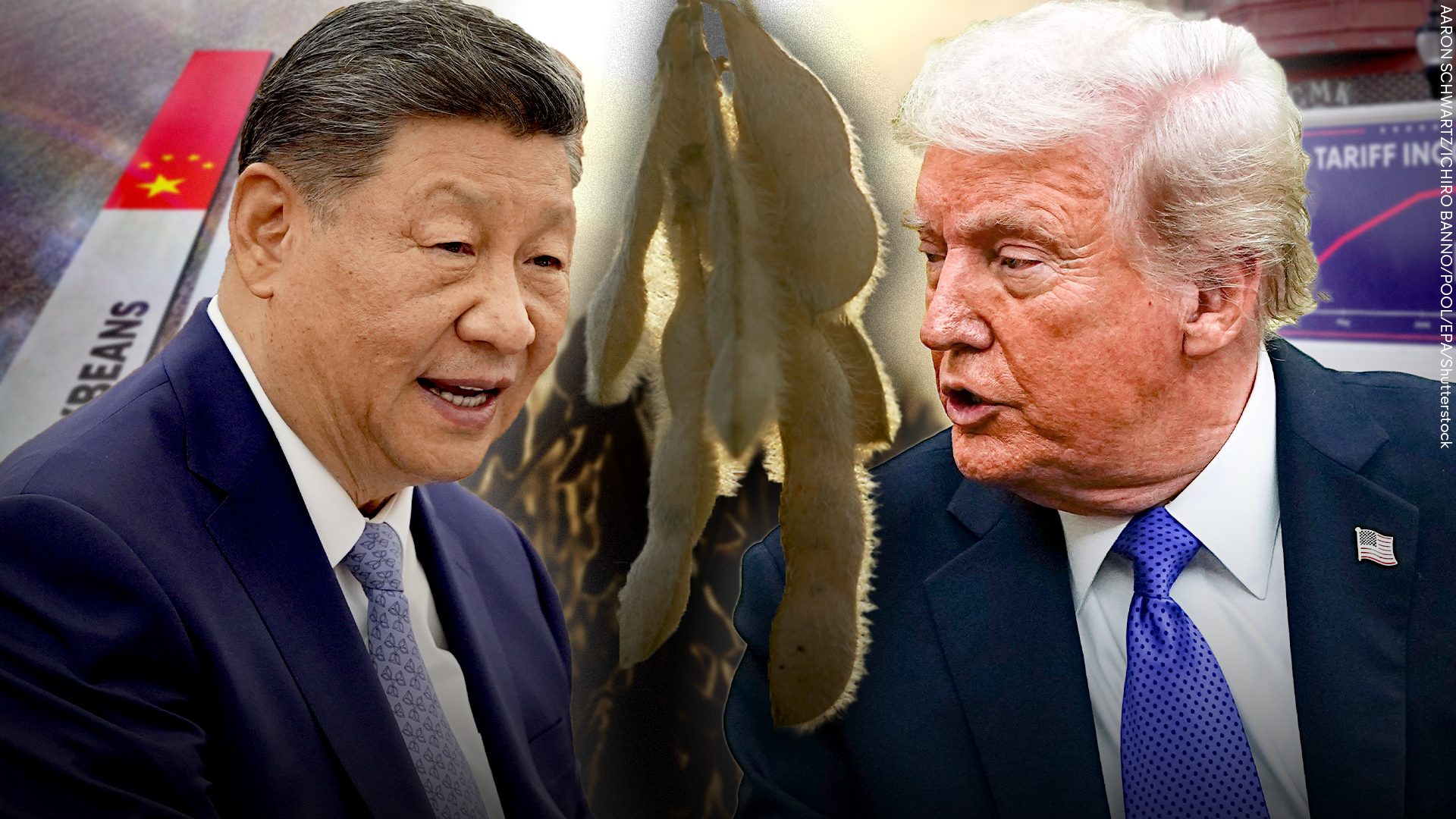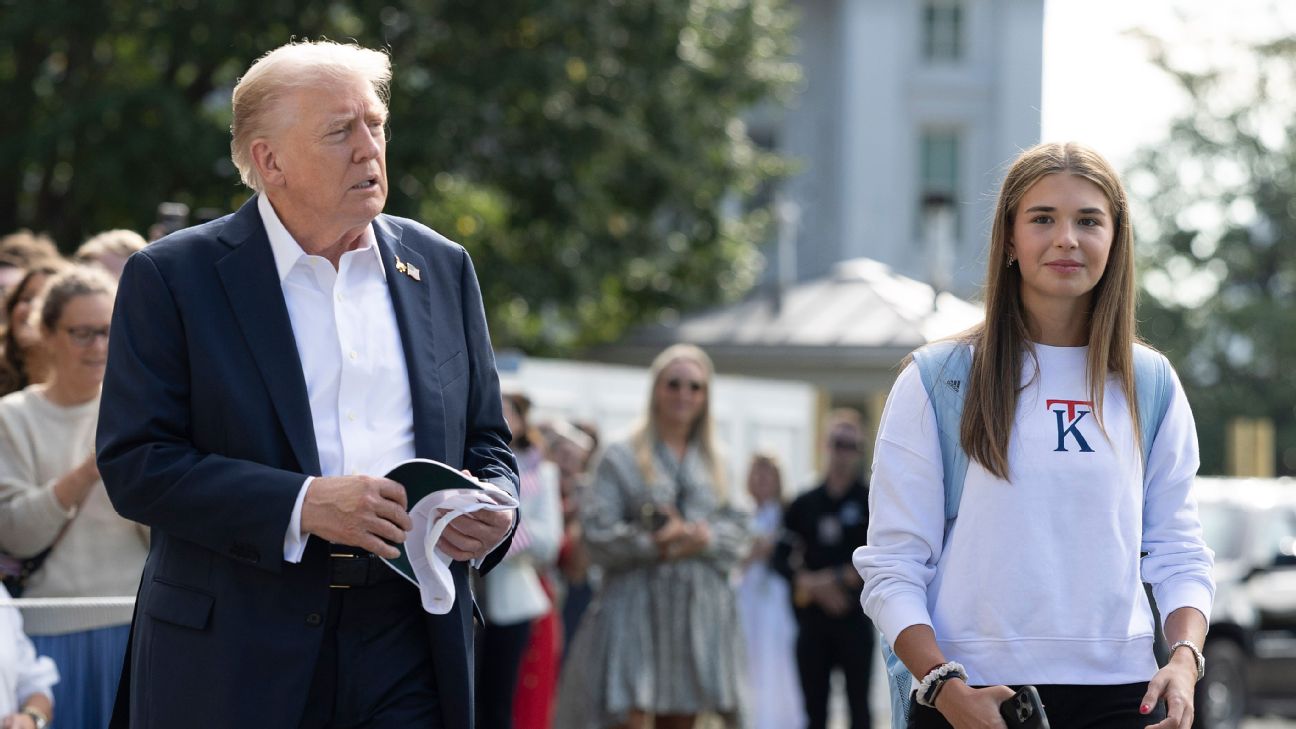Technology
How the humble soya bean has become a political weapon in US-China trade war
The humble soya bean has become an unlikely political weapon in the US trade war with China.
In rural Illinois, American farmers have the bittersweet reality of bringing in great harvest but losing their main buyer.
Last year, China bought billions of dollars worth of American farmed soy.
This year, in retaliation for Donald Trump’s tariffs, they haven’t bought a single bean.
“It’s a pretty big issue,’ says Luke Holst, who runs a family farm in Augusta with his father and brother.
“I don’t think they’ve bought anything yet. And I don’t think they plan to.”
Competing to be America’s number one crop
Soya bean farming has grown so fast in recent decades it now competes with corn as America’s number one crop.
It has also become America’s number one agricultural export, more valuable than beef, pork or dairy. And half of those soya bean exports had been going to China.
In Trump’s first term, the Chinese cut off American farms as punishment for the first wave of tariffs. Washington was forced to raise a $22bn bailout and eventually struck a deal with China.
‘Not a whole lot of hope’
Now, Midwestern farming families are facing the same crisis again.
Brady Holst, Luke’s brother, is vice-chairman of the Illinois Soybean Association and says that farmers in the state are now worried about bankruptcies.
“There’s not a whole lot of hope for even a quick fix. Even if China starts buying tomorrow, there’s a huge crop out there that needs to be moved,” he says.
Western Illinois is MAGA country, and many of the local republican politicians dance carefully between pledging allegiance to the White House while also pleading for financial aid or, more critically, a new deal with China to restart trade.
Down the road in the city of Macomb, the local university has a huge agricultural campus, with its own Frat House. Its president is Jace Green: a young, charismatic, sixth generation farmer who believes in the land, the Lord, and President Trump.
Green, like so many farmers in the Midwest, can rhapsodise at length about the values of American farming and the faith he has in the President. But it’s hard for him to square the current crises with those more fundamental beliefs.
“I’ve just got that unwavering faith in the Lord and I believe that Donald Trump is going to get us out of this one way or another,” he says.
He quickly adds: “He put us in it.”
“But I think that there’s a light at the end of the tunnel.”
Diversifying exports
Richard Stern from the Heritage Foundation – a conservative think-tank with huge influence in Washington – says American farmers need to wean themselves off China.
For Stern, a bailout is not the answer. Instead, he wants American exports to be going to Europe, the UK, and Asian allies like Japan.
“What we’re going to do is expand markets, free up trade, so [farmers] have markets they can go to where [they] don’t have to feel bad about it,” without “funding and feeding the Chinese Communist Party.”
He refutes the idea that farmers have become collateral damage in the trade war and insists in the end they’ll be better off.
The Heritage Foundation sees the trade war in two halves.
First, that the US and American companies stop trading with China. Second, that tariffs levelled against friendly allies are only a stopgap to win better terms for American-made products or US agriculture.
The impact of tariffs vs taxes
At the Peterson Institute for International Economics, Mary Lovely suggests that the income generated by tariffs is changing the US tax base, in a way that hurts Trump’s MAGA voters the most.
“Tariffs are highly regressive taxes,” she says.
“They’re taxes that fall more heavily on working and middle-class families than they do on the wealthy.
“And we are having a transformation of our tax system, where we’re relying less heavily on income taxes and corporate taxes and more heavily on tariffs.”
Lovely also says she worries the White House had not anticipated how forensic the Chinese could be.
“China has learned a lot since the first trade war. The game has broadened and the extent to which the Chinese are playing it has increased in its rapidity and in its sophistication,” she says.
Her view is that US farmers will have to look at switching to another crop to protect themselves.
“I think people are rather sceptical that any deal will be done or that these relationships will return to normal,” she says.
“And that lack of hope is a real challenge for farmers.
“They can’t continue to grow beans for a country that isn’t going to ever buy them again.”
Read the latest newsletter from Channel 4 News
The humble soya bean has become an unlikely political weapon in the US trade war with China.
In rural Illinois, American farmers have the bittersweet reality of bringing in great harvest but losing their main buyer.
Last year, China bought billions of dollars worth of American farmed soy.
This year, in retaliation for Donald Trump’s tariffs, they haven’t bought a single bean.
“It’s a pretty big issue,’ says Luke Holst, who runs a family farm in Augusta with his father and brother.
“I don’t think they’ve bought anything yet. And I don’t think they plan to.”
Competing to be America’s number one crop
Soya bean farming has grown so fast in recent decades it now competes with corn as America’s number one crop.
It has also become America’s number one agricultural export, more valuable than beef, pork or dairy. And half of those soya bean exports had been going to China.
In Trump’s first term, the Chinese cut off American farms as punishment for the first wave of tariffs. Washington was forced to raise a $22bn bailout and eventually struck a deal with China.
‘Not a whole lot of hope’
Now, Midwestern farming families are facing the same crisis again.
Brady Holst, Luke’s brother, is vice-chairman of the Illinois Soybean Association and says that farmers in the state are now worried about bankruptcies.
“There’s not a whole lot of hope for even a quick fix. Even if China starts buying tomorrow, there’s a huge crop out there that needs to be moved,” he says.
Western Illinois is MAGA country, and many of the local republican politicians dance carefully between pledging allegiance to the White House while also pleading for financial aid or, more critically, a new deal with China to restart trade.
Down the road in the city of Macomb, the local university has a huge agricultural campus, with its own Frat House. Its president is Jace Green: a young, charismatic, sixth generation farmer who believes in the land, the Lord, and President Trump.
Green, like so many farmers in the Midwest, can rhapsodise at length about the values of American farming and the faith he has in the President. But it’s hard for him to square the current crises with those more fundamental beliefs.
“I’ve just got that unwavering faith in the Lord and I believe that Donald Trump is going to get us out of this one way or another,” he says.
He quickly adds: “He put us in it.”
“But I think that there’s a light at the end of the tunnel.”
Diversifying exports
Richard Stern from the Heritage Foundation – a conservative think-tank with huge influence in Washington – says American farmers need to wean themselves off China.
For Stern, a bailout is not the answer. Instead, he wants American exports to be going to Europe, the UK, and Asian allies like Japan.
“What we’re going to do is expand markets, free up trade, so [farmers] have markets they can go to where [they] don’t have to feel bad about it,” without “funding and feeding the Chinese Communist Party.”
He refutes the idea that farmers have become collateral damage in the trade war and insists in the end they’ll be better off.
The Heritage Foundation sees the trade war in two halves.
First, that the US and American companies stop trading with China. Second, that tariffs levelled against friendly allies are only a stopgap to win better terms for American-made products or US agriculture.
The impact of tariffs vs taxes
At the Peterson Institute for International Economics, Mary Lovely suggests that the income generated by tariffs is changing the US tax base, in a way that hurts Trump’s MAGA voters the most.
“Tariffs are highly regressive taxes,” she says.
“They’re taxes that fall more heavily on working and middle-class families than they do on the wealthy.
“And we are having a transformation of our tax system, where we’re relying less heavily on income taxes and corporate taxes and more heavily on tariffs.”
Lovely also says she worries the White House had not anticipated how forensic the Chinese could be.
“China has learned a lot since the first trade war. The game has broadened and the extent to which the Chinese are playing it has increased in its rapidity and in its sophistication,” she says.
Her view is that US farmers will have to look at switching to another crop to protect themselves.
“I think people are rather sceptical that any deal will be done or that these relationships will return to normal,” she says.
“And that lack of hope is a real challenge for farmers.
“They can’t continue to grow beans for a country that isn’t going to ever buy them again.”
Read the latest newsletter from Channel 4 News




